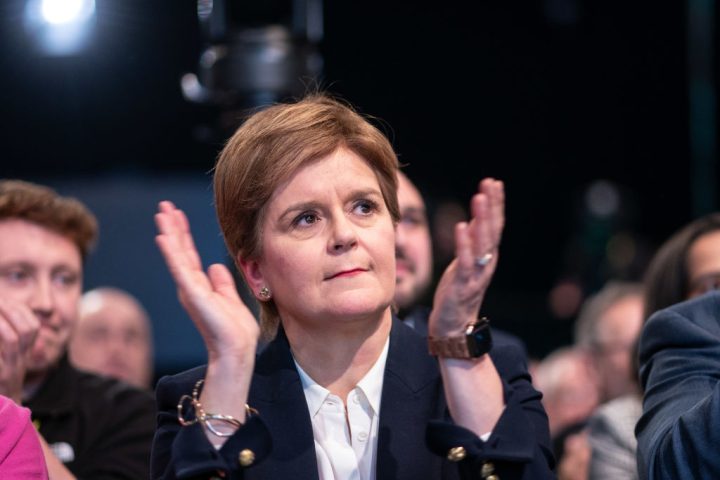It may seem perverse to claim that the former first minister of Scotland Nicola Sturgeon saved the Union between Scotland and England. She is after all a Scottish nationalist who has dedicated her life to the cause of Scottish independence. But her actions since she resigned exactly one year ago from her post as First Minister have set the independence cause back by at least 20 years, perhaps longer. Labour is back in contention in Scotland; no one is talking about an independence referendum any more; the SNP is now a divided party with a collapsing membership and a weak leader who has presided over a catalogue of policy failures. The dream, it seems, is over.
Unionists couldn’t believe their luck on that fatal February morning last year when Scotland’s greatest political export threw in the towel so casually, saying, in effect, that she’d had enough and wanted a new job. At the time, she commanded all she surveyed. The SNP dominated Scottish politics at every level: in Westminster and Holyrood, even local government. The opposition parties were getting precisely nowhere in their attempts to chip away at her record after nearly ten years in office. In her farewell press conference in Bute House, wearing her trademark scarlet suit, Sturgeon reminded Scotland that she’d led the SNP to eight straight election victories.
It’s said that all political careers end in tears, but rarely do they do so as literally as in Nicola Sturgeon’s case
Before her bombshell resignation, there had been a growing pessimism in Westminster about the future of the 300-year-old Union. The line held by successive UK Tory prime ministers that ‘now is not the time’ for a repeat referendum on independence was beginning to weaken. Former civil servants were taking to the airwaves arguing for pre-emptive action and even for a recognition that independence of some sort was inevitable. As democrats, UK governments could hardly ignore the fact that Scottish voters were giving the nationalists huge majorities in successive elections.
Many were as awestruck by Nicola Sturgeon’s political skills as they were appalled by her political philosophy. She’d become a celebrity politician with international recognition, lionised by the metropolitan media and culturatti. Writers queued up to be interviewed by the first minister at book festivals. Actors like Emma Thompson lauded her transgender policies and confidently predicted that independence was inevitable. Heavyweight political commentators like the Guardian’s Polly Toynbee agreed saying it was futile for UK parties to continue to oppose a second independence referendum. Sturgeon’s star shone most brightly in Europe where her anti-Brexit progressivism was was contrasted with Boris Johnson’s conservative populism.
So Nicola Sturgeon was undoubtedly going out on a high. But why quit without warning? This has never been fully explained. Sturgeon said she had been inspired by the New Zealand prime minister Jacinda Ardern’s resignation on the grounds that she had ‘nothing left in the tank’. Sturgeon wanted to become a ‘human being’ again, promote progressive causes and write her memoirs. She could not have imagined how the final chapter would pan out.
It’s often said that all political careers end in tears, but rarely do they do so as literally as in Nicola Sturgeon’s case. This political titan was reduced to a lachrymose wreck by her interrogation at the UK Covid Inquiry hearings last month. The pandemic was supposed to have been her finest hour, yet she now stood accused of politicising the crisis and failing to tell the truth about the deletion of WhatsApp messages.
Her party has been crying a river too over the collapse of its electoral fortunes since last February. There had been no transition planning and no recognised leader-in-waiting. The attempt to bounce her favoured candidate, Humza Yousaf, in a snap leadership election ended in chaos. Sturgeon’s husband, the SNP chief executive Peter Murrell, had to resign in the middle of it and Yousaf only scraped home in the final ballot, challenged by the former finance secretary Kate Forbes, a formidable critic of Sturgeon’s transgender bill and her coalition with the Scottish Green party.
Then, just weeks after her resignation, Sturgeon was arrested under Operation Branchform, the apparently endless investigation into party funds. She was released without charge, but that image of a police forensics tent erected outside her Uddingston home has become an enduring part of her political image.
Humza Yousaf has wrestled with her policy legacy only to be counted out by it. Her flagship bill to introduce self-ID for transgender people was blocked after the scandal of a male double rapist being placed on remand in a women’s prison. Sturgeon-era environmental policies like trying to ban petrol and diesel cars before the rest of the UK have been shelved. The fiscal hangover from the high-spending Sturgeon years has necessitated tax increases and cuts in public spending. One in eight Scots are languishing on hospital waiting lists.
SNP membership has nearly halved as Yousaf has failed to impose his authority on the party, most recently over the failure to sack the disgraced former health secretary Michael Matheson for lying about his expenses. As for Nicola Sturgeon, she remains in Holyrood a much diminished figure, with an uncertain future and a damaged reputation. But hey, supporters of the Union have rarely been happier.







Comments